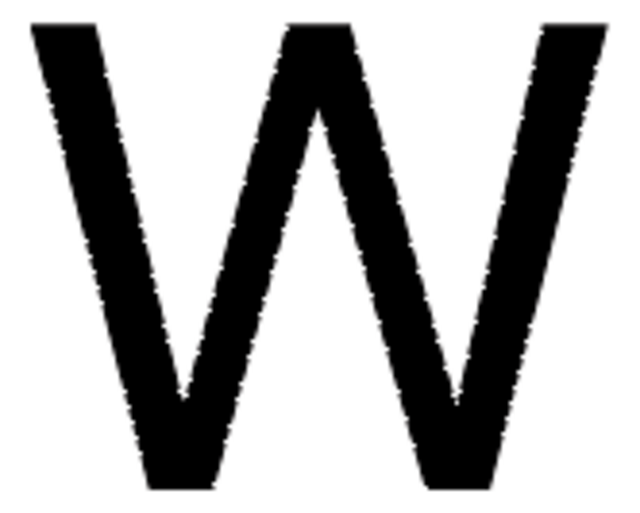267554
Tungsten
wire, diam. 0.25 mm, ≥99.9% trace metals basis
Synonym(s):
W
Sign Into View Organizational & Contract Pricing
All Photos(1)
About This Item
Empirical Formula (Hill Notation):
W
CAS Number:
Molecular Weight:
183.84
EC Number:
MDL number:
UNSPSC Code:
12141747
PubChem Substance ID:
NACRES:
NA.23
Recommended Products
Assay
≥99.9% trace metals basis
form
wire
resistivity
4.9 μΩ-cm, 20°C
diam.
0.25 mm
bp
5660 °C (lit.)
mp
3410 °C (lit.)
density
19.3 g/mL at 25 °C (lit.)
SMILES string
[W]
InChI
1S/W
InChI key
WFKWXMTUELFFGS-UHFFFAOYSA-N
Related Categories
Application
Tungsten (W) wire can be used for a variety of applications such as:
- fabrication of tungsten tips which can be used as field emitters, nanoprobes and scanning tunneling microscope (STM) probes.
- increase of the band gap of amorphous silicon germanium alloy.
- formation of tungsten fibers for potential usage in the lighting industry.
Quantity
9.5 g = 10 m; 95 g = 100 m
Storage Class Code
11 - Combustible Solids
WGK
nwg
Flash Point(F)
Not applicable
Flash Point(C)
Not applicable
Personal Protective Equipment
dust mask type N95 (US), Eyeshields, Gloves
Certificates of Analysis (COA)
Search for Certificates of Analysis (COA) by entering the products Lot/Batch Number. Lot and Batch Numbers can be found on a product’s label following the words ‘Lot’ or ‘Batch’.
Already Own This Product?
Find documentation for the products that you have recently purchased in the Document Library.
Customers Also Viewed
Tungsten fibre-reinforced composites for advanced plasma facing components
Neu R, et al.
Nuclear Materials and Energy, 12(1-2), 1308-1313 (2017)
Recrystallization of tungsten wire for fabrication of sharp and stable nanoprobe and field-emitter tips
Greiner M and Kruse P
The Review of Scientific Instruments, 78(2), 026104-026104 (2007)
Improving narrow bandgap a-SiGe: H alloys grown by hot-wire chemical vapor deposition
Xu Y, et al.
Thin Solid Films, 430(1-2), 197-201 (2003)
Weijie Zhao et al.
ACS nano, 7(1), 791-797 (2012-12-22)
Geometrical confinement effect in exfoliated sheets of layered materials leads to significant evolution of energy dispersion in mono- to few-layer thickness regime. Molybdenum disulfide (MoS(2)) was recently found to exhibit indirect-to-direct gap transition when the thickness is reduced to a
Michael L Crichton et al.
Biomaterials, 34(8), 2087-2097 (2012-12-25)
The recent emergence of micro-devices for vaccine delivery into upper layers of the skin holds potential for increased immune responses using physical means to target abundant immune cell populations. A challenge in doing this has been a limited understanding of
Our team of scientists has experience in all areas of research including Life Science, Material Science, Chemical Synthesis, Chromatography, Analytical and many others.
Contact Technical Service

